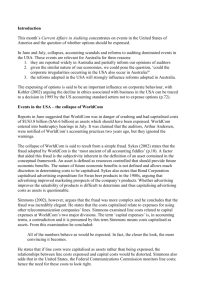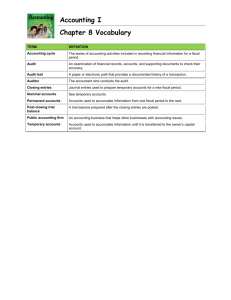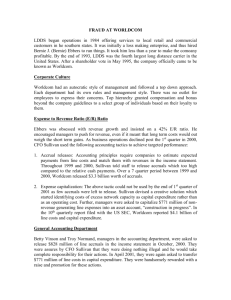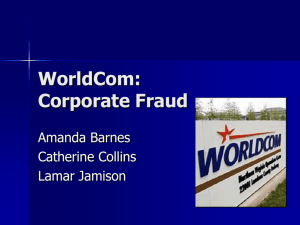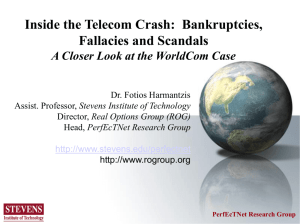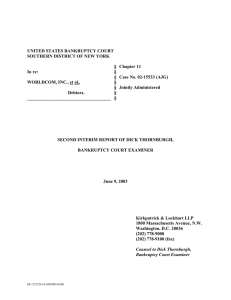Internal Auditing
advertisement
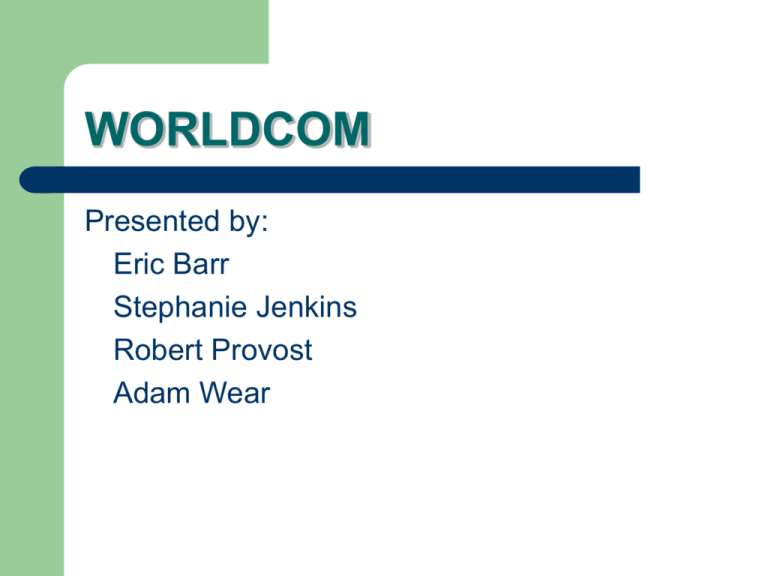
WORLDCOM Presented by: Eric Barr Stephanie Jenkins Robert Provost Adam Wear WorldCom What are the facts? – – – – Ebbers (CEO) had used his company stock as collateral for both professional and personal loans Ebbers and Sullivan (CFO/CPA) “frequently made the decision to grant excessive compensation” Line Costs were capitalized as “Prepaid Capacity” A long time ensued before Cynthia Cooper came forward with the inaccurate accounting practice What are the Ethical Issues? Was capitalizing line costs ethical? Was going along with the capitalization ethical? Was using company stock as collateral for loans ethical? Was having a no-question culture ethical? Should Andersen have questioned treatment of capitalization more? Alternatives Ebbers could have changed his business strategy Sullivan could have refused to go along with accounting practices External Auditors could have questioned more Internal employees could have come forward Internal Audit could have had stronger presence Stakeholders Employees (Including Upper Management) External Auditors Shareholders of Stock Competitors Lenders Customers Practical Constraints Ebbers would have gone bankrupt Company would suffer large losses Employees could lose job External Audit Firm could lose client Internal Audit kept busy away from auditing Did the Top Executives Act Ethically? Bernard Ebbers, CEO – – Participated in improper lowering of expenses and inflating revenues. Had continued to acquire companies and put WorldCom into debt and had used WorldCom stock as collateral for his own investments Scott Sullivan, CFO – – – Also participated with Ebbers in improper accounting Made sure the internal auditors time was spent on operational audits almost exclusively Pushed employees to make entries with no evidence and meet numbers no matter what Did the Top Executives Act Ethically? David Meyers, Controller – – Pressured along with Sullivan for reduced line costs in whatever way possible Made entries to falsify financial reports with no documentation or justification Ronald Lomenzo, Sr. VP Financial Operations – – Prepared MonRev and Corporate Unallocated Schedule reports Booked entries on the schedule and restricted distribution Did the Top Executives Act Ethically? Buford Yates, Director General Accounting – Cynthia Cooper, VP Internal Audit – Participated in and encouraged the improper accounting even though he saw no justification for it Uncovered the accounting fraud and blew the whistle Steven Brabbs, Europe & Asia Executive – – Questioned unjustified entries to top exectutives and Arthur Anderson Refused to make the entry, but eventually did record it through a management company adjustment Did the Top Executives Act Ethically? Delores DiCicco, VP Wireless Finance – Refused make an entry with no support despite heavy pressure Troy Normand & Betty Vinson – – Felt uneasy about some of the entries but did nothing to stop them Normand says he was scared of losing his job and putting his family in financial jeopardy Why Record False Entries? Bonuses/Perks dealt with bottom line performance Mandated to make false entries by upper management Assumed it was correct, no support asked for Fear for Job Raise Company Stock Price What would you have done? What are the facts? Steven Brabbs Troy Normand Vice President of International Controls in London Director of Legal Entity Accounting One of first to notice accounting irregularities Warehoused balance sheet accruals Notified Senior executives at WorldCom Notified Arthur Andersen auditors No documentary support for any of the entries posted to these general accounts Refused to make the entry on the international companies books Initially questioned the entries Later thought about resigning What are the Ethical Issues? Steven Brabbs Troy Normand Should he make the entry without backup? Are the accruals appropriate? Does the entry fairly represent company events? Should he have taken a stronger stance? Who should he inform about the issue? Who should he inform about the issue? What are the Alternatives? Steven Brabbs Troy Normand Follow corporate orders and make the entry Follow corporate orders and make the entry Make the entry on separate books Make the entry on separate books Refuse the entry Refuse the entry Report the incident Report the incident Resign Resign Who are the Primary Stakeholders? WorldCom Employees Family Members Stockholders Creditors Arthur Andersen Auditors What are the Practical Constraints? Disobeying could prevent future promotions Difficult to identify when your boss is wrong Need to support a family Difficult to blow the whistle on something that you are involved in Who Was More Ethical? Steven Brabbs Notified Arthur Andersen on at least two occasions Refused to make entries to international books Set up a non-legal entity to make the entry Troy Normand Never contacted auditors Made non-GAAP entries to his account Ignored initial reservations Internal Auditing Portray the firm’s financial situation as accurately and truthfully as possible. Maintain the highest standards of ethical conduct. Disclose fully all relevant information that could reasonably be expected to influence an intended user’s understanding of the records, comments, and recommendations presented. Maintain an appropriate level of knowledge and skill (competency). Refrain from disclosing confidential information except when authorized or required by law (confidentiality). Avoid conflicts of interest (integrity). Communicate information fairly and objectively (objectivity). Independent Auditing Must Follow GAAS which includes both field work and reporting standards. Cohen Commission: Primary Role: Serve as intermediate between the financial statement and the users of those statements. Determine whether the judgments of managers in the selection and application of accounting principles were appropriate or inappropriate for use in the matter at hand. Express an opinion on internal accounting control. Detect and report errors, irregularities, and/or fraud. Independent Auditing Judge Burger: (Arthur Young Case, 1984) Examine the corporation’s books and records. Determine whether the financial reports of the corporation have been prepared in accordance wither generally accepted accounting principles Issue an opinion as to whether the financial statements, taken as a whole, fairly present the financial position and operations of the corporation for the relevant period. Maintain total independence from the client at all times. Maintain complete fidelity to the public trust. Operating Audit vs. Financial Audit 1. Purpose of Audit – 2. – Emphasizes whether historical information was correctly reported; oriented to the past; – Report typically goes to many users of financial statements. – Limited to matters that directly affect the fairness of financial statement presentations. Distribution of Reports – 3. Emphasizes effectiveness and efficiency; concerns operating performance for the future; Reports are intended primarily for management. Inclusion of nonfinancial areas – Cover any aspect of efficiency and effectiveness in an organization and involve a wide variety of activities. WorldCom’s Internal Auditors and Audit Committee Internal auditors performed mainly operational audits. Avoided financial audits that might overlap with the work of external auditors on the grounds of cost savings. Internal Auditors only reported to audit committee at year-end. Reported to Scott Sullivan the rest of the year, who controlled their promotions, salary increases, bonuses, stock options, and more. Assignment of “special projects” with no audit purpose, which consumed most of the time of the Internal Audit’s staff. Audit committee accepted proposed Internal Audit Plan that focused on operational effectiveness and efficiency, systems, and internal controls. What are the Facts? Salomon Smith Barney offered 1 million shares of IPOs to WorldCom CEO Salomon Smith Barney gave WorldCom positive reports despite suspect financials WorldCom CEO eventually made more than $11 million from trading What are the Ethical Issues? Bankers were selectively doling out IPO shares to individual executives instead of the public Financial reviews were being completed by the same company that depended lucrative banking business from the client What are the Alternatives? Require that clients purchase their stock shares through public forum Set guidelines for selling IPO shares to clients Disclose financial relationships of clients during reviews Require holding period for IPO purchases for clients Who are the Primary Stakeholders? Salomon Smith Barney WorldCom CEO and IPO holder The general public The company offering the IPO Analysts in charge of reviewing WorldCom What are the Practical Constraints? Trying to maintain practical professional relationships Competitive environment pressures institutions to provide incentives What Actions should be Taken? IPOs should not be given out selectively by the bank to clients Analyst reviews of clients should declare that relationship WorldCom 2002 saw an unprecedented number of corporate scandals: Enron, Tyco, Global Crossing. WorldCom went from being the nation’s second largest long distance carrier to the brink of bankruptcy as a result of massive fraudulent accounting practices. WorldCom is another case of failed corporate governance, accounting abuses, and outright greed.
